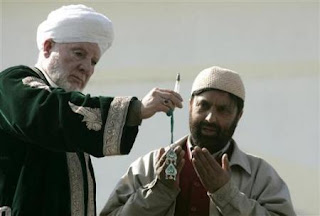

It may sound unbelievable to many but in point of fact, no less than 50 Kashmiri Muslim families have been occupying a distinct land in the Indian state of West Bengal. Are you shocked? Have you started recalling harrowing experiences of thousands of Kashmiri Hindu families? It is quite natural for a sensible individual like you but not for the controlling authority calling the shots at every time barring anything related to Muslims or the saga of secularism. It has come to the knowledge that the aforementioned families have raised tents next to Dakshineshwar temple in the northern fringes of Kolkata for two months.
To be precise, a big section of unoccupied land at Rajabagan, predestined for an Expressway only, has turned out to be the provisional address for 350 to 400 Kashmiri Muslim refugees. It is worthwhile to mention that the majority of these people hail from Baramulla, Badaun and adjacent areas of the tumultuous Kashmir valley. Here is a brief description of these alleged hapless people. Among these people there are fruit vendors and tangawalaas (drivers of horse-driven carts) and are representing a few known places like Patnitop and Pahelgam.
What makes these people come all the way from Kashmir and stay in Bengal, even if temporarily? There has been no straight answer to all these but Kashmiri Muslims have maintained that regular strifes were making their lives miserable. Whatever it is all these have resulted in a deep encouragement among Muslim teenagers who are leaving no stone unturned to help them. How do these people reside in an alien land then?
The acts of imprudent, egotistical, ignorant and above all, great adorers of secularism can’t be overlooked. While they have water from Kishore Sangha, a local club along with adjacent municipal taps, foods are served by local mosques, NGOs and Gurudwara Singh Sabha of Baranagar. Truly a contest is going on before election in Bengal to prove oneself as most on-key secularist! Male members are being found to earn some money through doing jobs of daily laborers and rickshaw-pullers.
How is the government machinery dealing with these sudden and strange guests? Majority of the government echelons remain ignorant of this, as usual. But the clued-up ones made enquiries and the answers satisfied them to a large extent.
Now the question remains – how can these people be depended on. How can people representing majority section of the state, vociferous and also outrageous to the existence of innocent minority Hindus leaving for centuries there, be tolerated? The answer is simple – in no way. Surely the same issue is haunting millions of Hindus across the state as well but they have no option to stand unitedly against all these nefarious designs.
Who knows this is a good way to inject terrorism in a state already beleaguered with exponential increase in minority Muslim population and instigations from across the border? Unless they start standing together, Hindus’ future is doomed forever.


